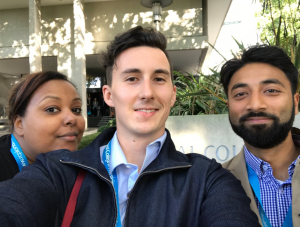The second annual Faculty of Physician Associates’ (FPA) conference took place in the beautiful Royal College of Physicians (RCP) building in London located next to Regent’s Park this September. This was my first experience attending a conference so I was very much looking forward to what the event could offer. I attended the conference with two of my colleagues: all three of us Physician Associate MSc students from Hull York Medical Students. We were impressed by the organisation and calibre of speakers over the two days – as well as the delicious lunch provided
 From discussing hot topics on acute medicine to changing how we think about palliative care, the conference covered many aspects of everyday practice and challenges that many healthcare professionals face. It was a highly stimulating couple of days for me where I could improve my networking skills as well as my clinical knowledge. For people who haven’t yet been to a conference, I highly recommend it as a friendly event.
From discussing hot topics on acute medicine to changing how we think about palliative care, the conference covered many aspects of everyday practice and challenges that many healthcare professionals face. It was a highly stimulating couple of days for me where I could improve my networking skills as well as my clinical knowledge. For people who haven’t yet been to a conference, I highly recommend it as a friendly event.
What I found most encouraging from the conference was the positivity and enthusiasm I saw from the qualified PAs. They were working in a variety of specialisms including gastrointestinal medicine, acute medicine, respiratory medicine, and even breast surgery. It gives me confidence that the role of a PA is rapidly developing and that the demand for PAs working in these specialisms are there.
Some of the delegates at the conference shared experiences of working as a PA within a clinical team, including some of the challenges they faced. A common theme seemed to be the reluctance of some people to accept change to the modern clinical workforce, and a lack of understanding of the PA role. Hopefully, improving awareness of the PA role as well as more exposure to PAs in clinical practice will help to reduce perceived tensions. A pertinent comment was made during the discussion reflecting on when Health Care Assistant and Advanced Care Practitioner roles were first introduced less than a decade ago. They faced similar difficulties as PAs regarding recognition of the role; and yet look at how well they have gelled into the medical workforce we see now. Change takes time to develop and mature, and I am confident that the PA role will naturally fit into the workforce in due course. To support this integration, the RCP have produced a guide which should help everyone to understand the role of the PA, how they work, where they fit into the team, and their scope of practice.
Perhaps it should be reiterated that PAs are not here to replace a doctor as some articles suggest, nor are they to replace any other role. Rather, what I have learned from this conference, after speaking to several doctors, is that there has been a positive contribution and an enhancement to the clinical workforce from the PA role. This relationship is not a confrontation but a collaboration. Working together, we can try to deal with the wider issues the NHS faces.
The role is rapidly growing with an estimated 3,000 qualified PAs by 2020, 1,000 of which have been pledged by Jeremy Hunt to work in general practice to support the staff shortage and increasing demands of primary care. Regulation-wise, the FPA are still doing their very best in pushing forward the case of finally getting statutory regulation for PAs. It is a long journey but progress is being made and I hope within the coming years we will be a regulated body.
I am pleased to inform you that a recent open consultation has begun with the HEE and the Department of Health. If you could spare a few minutes to complete the online survey it would greatly help our progress to gaining statutory regulation and to be able to provide the care of which I believe we are capable.
 Amanda Ibrahim, Anthony Cosgrove, and Shu-aib Rasul are Physician Associate students at HYMS.
Amanda Ibrahim, Anthony Cosgrove, and Shu-aib Rasul are Physician Associate students at HYMS.

